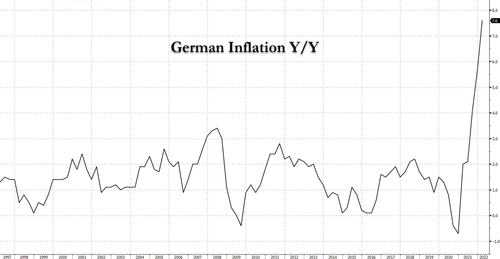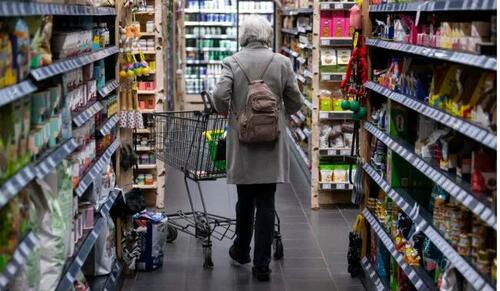German Retailers To Increase Food Prices By 20-50% On Monday
Just days after Germany reported the highest inflation in generation (with February headline CPI soaring at a 7.6% annual pace and blowing away all expectations), giving locals a distinctly unpleasant deja vu feeling even before the Russian invasion of Ukraine broke what few supply chains remained and sent prices even higher into the stratosphere…
… on Monday, Germany will take one step toward a return of the dreaded Weimar hyperinflation, when according to the German Retail Association (HDE), consumers should prepare for another wave of price hikes for everyday goods and groceries with Reuters reporting that prices at German retail chains will explode between 20 and 50%!
Even before the outbreak of war in Ukraine, prices had risen by about five per cent “across the product range” as a result of increased energy prices, HDE President Josef Sanktjohanser told the Neue Osnabrücker Zeitung on Friday. With Russia’s invasion hitting economies and the supply chain harder, yet another series of price increases is on the horizon.
“The second wave of price increases is coming, and it will certainly be in double figures,” Sanktjohanser warned, cited by The Local.
According to the president of the trade association, the first retail chains have already started to raise their prices in Germany – and the rest are likely to follow.
“We will soon be able to see the impact of the war reflected in price labels across all the supermarkets,” said Sanktjohanser.
Recently, popular retail chains such as Aldi, Edeka and Globus announced that they would be forced to raise their prices. At Aldi, meat and butter will be “significantly more expensive” from Monday due to price hikes from its suppliers.
“Since the start of the Ukraine war, there have been jumps in purchase prices that we have not experienced before,” a spokesperson for Aldi Nord announced on Friday.
A fortnight ago, Aldi raised the prices of about 160 items, and a week later 20 more items became more expensive. Other supermarket brands quickly followed suit.
In February, Germany’s cost of living rose at the highest level since reunification, with everyday goods increasing by an average of 7.3%. The federal statistics agency Destatis said the jump from January’s figure of 5.1 percent to February’s 7.3 percent reflected the impact of Russia’s invasion of Ukraine, which has sent the price of oil and gas soaring.
According to a recently published survey by the Ifo Institute, almost all companies in Germany’s food retail sector are planning price increases.
Though price increases are a worry for Germany’s hard-hit consumers, industry experts don’t expect there to be a lack of products on the shelves anytime soon. Which, of course, is to be expected when prices surge so high far fewer can afford to buy products.
According to Joachim Rukwied, president of the farming association, the food supply in Germany is assured for at least another year – though after this the forecasts are less certain. With rumors of shortages swirling around, however, supermarket owners have been complaining of the sort of panic-buying not seen since the first months of pandemic.
As previously noted, German supermarkets have even started limiting the purchase of cooking oils and flour in particular to prevent a mad rush to stock up on items that customers believe will run out. In other words, limit the sale of those products which are in highest demand, also known as a “brilliant strategy.”
And now that everyday food product prices are about to surge as much as 50%, it will be interesting to watch how much longer the German population will condone a NATO stance that has been seeking to stoke and perpetuate the war in Ukraine.
Tyler Durden
Sun, 04/03/2022 – 13:55
via ZeroHedge News https://ift.tt/PvZAaty Tyler Durden

